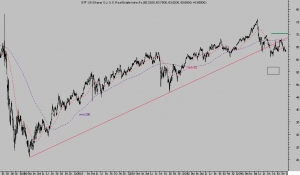Desde 2009, bancos y entidades financieras están disfrutando su particular luna de miel con la FED, quien absorbe sus activos tóxicos y ofrece dinero casi gratuitamente.
En los últimos meses apenas se cuestiona la fortaleza de la banca USA, hasta que esta semana Reuters ha publicado una reveladora noticia, titulada A New Wave of U.S. Mortgage Trouble Threatens: “U.S. borrowers are increasingly missing payments on home equity lines of credit they took out during the housing bubble, a trend that could deal another blow to the country’s biggest banks. The loans are a problem now because an increasing number are hitting their 10-year anniversary, at which point borrowers usually must start paying down the principal on the loans as well as the interest they had been paying all along.
More than $221 billion of these loans at the largest banks will hit this mark over the next four years, about 40 percent of the home equity lines of credit now outstanding.
For a typical consumer, that shift can translate to their monthly payment more than tripling, a particular burden for the subprime borrowers that often took out these loans. And payments will rise further when the Federal Reserve starts to hike rates, because the loans usually carry floating interest rates.
The number of borrowers missing payments around the 10-year point can double in their eleventh year, data from consumer credit agency Equifax shows. When the loans go bad, banks can lose an eye-popping 90 cents on the dollar, because a home equity line of credit is usually the second mortgage a borrower has.”
El sector inmobiliario es uno de los principales objetivos de la FED, en cuanto al efecto creación de riqueza que supone para los ciudadanos. Las noticias de evolución del sector son aún poco elocuentes sobre su pretendida recuperación y la perspectiva técnica sigue sin variaciones respecto de las previsiones expuestas en el post del pasado 30 de septiembre
ETF REAL ESTATE
¿Demandarán al regulador?
Los bancos americanos se revuelven contra la transparencia y están particularmente molestos con las normas propuestas por el Commodity Futures Trading Commission- CFTC- orientadas a aumentar la regulación y supervisión en operaciones de derivados.
La propuesta pretende forzar a los dealers en derivados a realizar las liquidación de sus operaciones más complejas a través de ambas plataformas, en USA y Europa, cuando actualmente sólo tienen obligación de hacerlo en una de ellas.
Huyen del control y se disponen a demandar al CFTC por violar los -«sus»- procedimientos al proponer normas de regulación antiguas, enmarcadas en la doctrina Dodd-Frank. Afirman que es una duplicidad de costes innecesaria y un atentado contra Wall Street.
De acuerdo con un artículo publicado por Bloomberg: «The banks grouse that the proposals would grant the CFTC oversight over complex international swaps deals — even if a US institution has a minor or passing role in the transaction.
The proposed rules]could adversely impact market liquidity and the ability of end-users to manage their risks,” an ISDA spokesman said in a statement.
Market participants and international policy-makers are extremely concerned about the impact of the CFTC’s cross-border guidance and related recent advisories,” the spokesman said.
SIFMA and the CFTC did not return calls for comment.
One source said that the lawsuit seeking to block implementation of the rules, which could kick in before year-end, would likely be filed in either Washington, DC, or Manhattan federal court.
The suit will claim that the CFTC overstepped when it proposed the rules without giving industry participants a chance to weigh in first during a comment period.
This rule is simply a work-around by Gensler that he’s trying to get through as he’s headed out the door,” said on industry official familiar with the looming lawsuit».
¿Impondrán remuneraciones negativas?
La raza de banqueros lleva en su genética una programación combativa «ad nauseum». Después de la última reunión del FOMC, en octubre, se mencionó la idea de situar los tipos de facilidad de depósito de la FED en tasas negativas, los banqueros han reaccionado mostrando descontento a través de misivas enviadas al Financial Times, amenazando con trasladar ese coste directamente a los depositarios. Es decir, con cobrar en lugar de remunerar los depósitos de sus clientes, vean noticia
